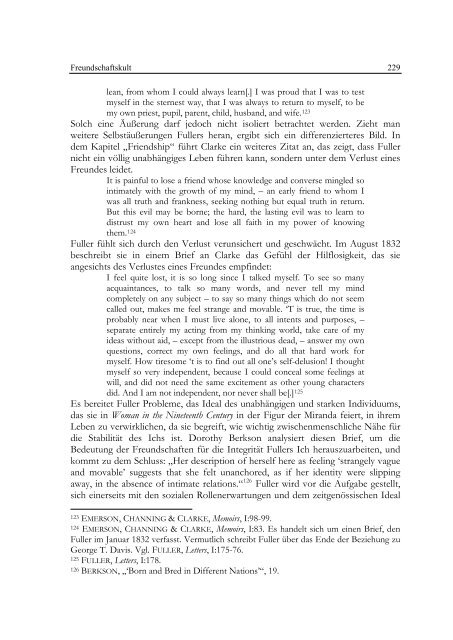Margaret Fullers transnationales Projekt : Selbstbildung, feminine ...
Margaret Fullers transnationales Projekt : Selbstbildung, feminine ...
Margaret Fullers transnationales Projekt : Selbstbildung, feminine ...
Erfolgreiche ePaper selbst erstellen
Machen Sie aus Ihren PDF Publikationen ein blätterbares Flipbook mit unserer einzigartigen Google optimierten e-Paper Software.
Freundschaftskult 229<br />
lean, from whom I could always learn[.] I was proud that I was to test<br />
myself in the sternest way, that I was always to return to myself, to be<br />
my own priest, pupil, parent, child, husband, and wife. 123<br />
Solch eine Äußerung darf jedoch nicht isoliert betrachtet werden. Zieht man<br />
weitere Selbstäußerungen <strong>Fullers</strong> heran, ergibt sich ein differenzierteres Bild. In<br />
dem Kapitel „Friendship“ führt Clarke ein weiteres Zitat an, das zeigt, dass Fuller<br />
nicht ein völlig unabhängiges Leben führen kann, sondern unter dem Verlust eines<br />
Freundes leidet.<br />
It is painful to lose a friend whose knowledge and converse mingled so<br />
intimately with the growth of my mind, – an early friend to whom I<br />
was all truth and frankness, seeking nothing but equal truth in return.<br />
But this evil may be borne; the hard, the lasting evil was to learn to<br />
distrust my own heart and lose all faith in my power of knowing<br />
them. 124<br />
Fuller fühlt sich durch den Verlust verunsichert und geschwächt. Im August 1832<br />
beschreibt sie in einem Brief an Clarke das Gefühl der Hilflosigkeit, das sie<br />
angesichts des Verlustes eines Freundes empfindet:<br />
I feel quite lost, it is so long since I talked myself. To see so many<br />
acquaintances, to talk so many words, and never tell my mind<br />
completely on any subject – to say so many things which do not seem<br />
called out, makes me feel strange and movable. ‘T is true, the time is<br />
probably near when I must live alone, to all intents and purposes, –<br />
separate entirely my acting from my thinking world, take care of my<br />
ideas without aid, – except from the illustrious dead, – answer my own<br />
questions, correct my own feelings, and do all that hard work for<br />
myself. How tiresome ‘t is to find out all one’s self-delusion! I thought<br />
myself so very independent, because I could conceal some feelings at<br />
will, and did not need the same excitement as other young characters<br />
did. And I am not independent, nor never shall be[.] 125<br />
Es bereitet Fuller Probleme, das Ideal des unabhängigen und starken Individuums,<br />
das sie in Woman in the Nineteenth Century in der Figur der Miranda feiert, in ihrem<br />
Leben zu verwirklichen, da sie begreift, wie wichtig zwischenmenschliche Nähe für<br />
die Stabilität des Ichs ist. Dorothy Berkson analysiert diesen Brief, um die<br />
Bedeutung der Freundschaften für die Integrität <strong>Fullers</strong> Ich herauszuarbeiten, und<br />
kommt zu dem Schluss: „Her description of herself here as feeling ‘strangely vague<br />
and movable’ suggests that she felt unanchored, as if her identity were slipping<br />
away, in the absence of intimate relations.“ 126 Fuller wird vor die Aufgabe gestellt,<br />
sich einerseits mit den sozialen Rollenerwartungen und dem zeitgenössischen Ideal<br />
123 EMERSON, CHANNING & CLARKE, Memoirs, I:98-99.<br />
124 EMERSON, CHANNING & CLARKE, Memoirs, I:83. Es handelt sich um einen Brief, den<br />
Fuller im Januar 1832 verfasst. Vermutlich schreibt Fuller über das Ende der Beziehung zu<br />
George T. Davis. Vgl. FULLER, Letters, I:175-76.<br />
125 FULLER, Letters, I:178.<br />
126 BERKSON, „‘Born and Bred in Different Nations’“, 19.

















